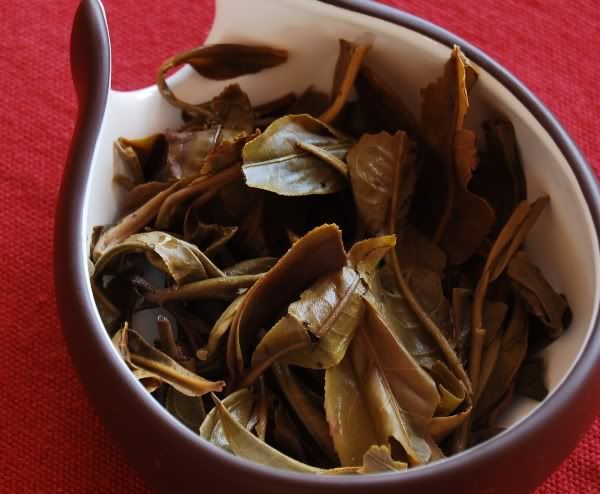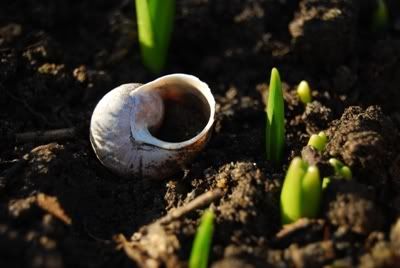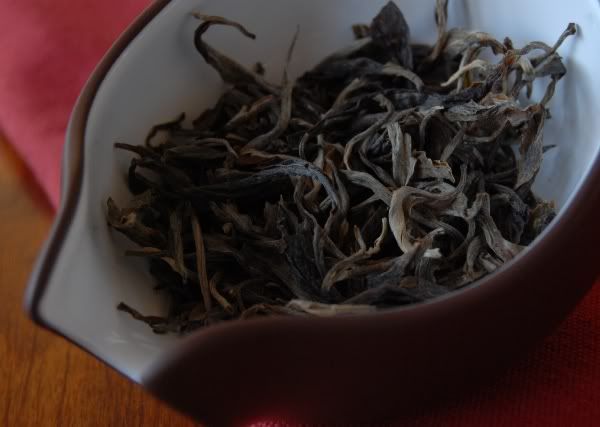Everywhere, the aroma of spring.
I step out into the garden and realise that, while I have been buried in simulations, writing, and redecoration, the world is changing, and everything is starting all over again. I'm really looking forward to having my life returned to me, after final submission of my work. After so many years, I don't think I'll be able to comprehend what's it like not to have the burdens of a degree weighing on my mind.
Old husks, new shoots.
I step out into the garden and realise that, while I have been buried in simulations, writing, and redecoration, the world is changing, and everything is starting all over again. I'm really looking forward to having my life returned to me, after final submission of my work. After so many years, I don't think I'll be able to comprehend what's it like not to have the burdens of a degree weighing on my mind.
Old husks, new shoots.
This tea harks back to the mild spring of 2008, kindly provided by Nada. I consider it to be the twin of the delicious 2008 Laobanzhang maocha that provided such a valuable insight into the character of actual "LBZ": purity, power, plenty of mushrooms and sweetness.
I recall from Nada's travellog that the town of Laobanzhang [Old Banzhang] takes its security rather seriously, searching all those that enter and leave the settlement to ensure that only local leaves are sold as "Laobanzhang". The next town over is called, rather imaginatively, "Xinbanzhang" [New Banzhang], and this maocha is a second flush selection from there.
I recall from Nada's travellog that the town of Laobanzhang [Old Banzhang] takes its security rather seriously, searching all those that enter and leave the settlement to ensure that only local leaves are sold as "Laobanzhang". The next town over is called, rather imaginatively, "Xinbanzhang" [New Banzhang], and this maocha is a second flush selection from there.
I've said it before, and I'll say it again: I love maocha. What a great way to enjoy pu'er: unadulterated, unprocessed, untampered. Just straight, honest pu'er leaves. They are a joy to behold, as pictured above, in all their furry finery.
These particular leaves are pungently sweet. I soften them up with a little warm water so that they can be eased into Zidu [my fat little teapot] without breaking.
These particular leaves are pungently sweet. I soften them up with a little warm water so that they can be eased into Zidu [my fat little teapot] without breaking.
The image above shows the soup to be rather orange, whereas it only turns this colour after being left out in the air for a minute. Straight out of the pot, it is a charming yellow hue - a thin, translucent yellow that reminds me of crisp French Chardonnay.
The aroma of the soup is a bold, punchy sweetness of complex sugars - it hangs forever in the nose.
Maocha can tend towards the simple, which is not a bad thing, though this particular example shows a fine range of long, sweet flavours that remind me of sweet leather. The first thing I notice with this tea is its vibrancy, filling the mouth with energy and liveliness.
The huigan [returning sweetness] lands in the throat with a resonating mushroom aroma in the back of the nose. After a good night's sleep, this session early on a Sunday morning leaves me feeling clean, fresh, and alert. It is a good time to drink shengpu.
The aroma of the soup is a bold, punchy sweetness of complex sugars - it hangs forever in the nose.
Maocha can tend towards the simple, which is not a bad thing, though this particular example shows a fine range of long, sweet flavours that remind me of sweet leather. The first thing I notice with this tea is its vibrancy, filling the mouth with energy and liveliness.
The huigan [returning sweetness] lands in the throat with a resonating mushroom aroma in the back of the nose. After a good night's sleep, this session early on a Sunday morning leaves me feeling clean, fresh, and alert. It is a good time to drink shengpu.

If the Laobanzhang was all mushroom, this Xinbanzhang is perhaps more sweet, though they are birds of a very close feather. Given the close proximity of Lao- and Xinbanzhang, perhaps that shouldn't be surprising. I imagine that many unscrupulous producers use leaves from areas nearby to Laobanzhang and claim them as being the real thing. However, my little encounter with this lovely maocha reminds me that it might not be a bad thing, at least from the perspective of the tea's quality, if not it's price.
Thanks again to Nada for another instructive and enjoyable session.
Thanks again to Nada for another instructive and enjoyable session.




I like how thick and almost succulent the leaves look in your leaf-display-thing-whose-name-I've-forgotten.
ReplyDeleteFree Ban Zhang from the oppressive world government... Ban Zhang Power!!!
ReplyDeleteDear CB,
ReplyDeleteThat's "Lesseps", our chahe [CHAR-HER]! Succulance aplenty!
Dear Anon,
I wonder if the market will correct itself - 600 RMB/kilo on top of 400 RMB/kilo prices might not be sustainable in a market environment, in the long-term. That said, I suspect the HK company isn't thinking about the long-term...
Toodlepip,
Hobbes